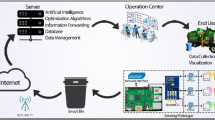Abstract
Deep learning (DL), machine learning (ML), computer vision, and Internet of things (IoT) have played a significant role in innovation of new intelligent and smart systems having digital eyes and brains. These modern systems are capable of taking their decisions on their own. Earlier systems designed were only using one technology but think about the modern IoT systems having the power of computer vision, deep learning, and AI. Our proposed work tends to combine the power of DL and IoT to propose a unique waste segregation technique that comes with the least sensors and fast decision-making capability with easy installation. It easily separates organic, recyclable, and electronic waste, thus making it eco-friendly and contributing toward a greener environment. Our major contribution is the waste dataset which contains waste belonging to three categories organic, recyclable, and electronic waste along with the novel IoT-enabled smart dustbin which uses cloud technology and is power efficient.
Access this chapter
Tax calculation will be finalised at checkout
Purchases are for personal use only
Similar content being viewed by others
References
Fan YJ, Yin YH, Da Xu L, Zeng Y, Wu F (2014) Iot-based smart rehabilitation system. IEEE Trans Industr Inf 10(2):1568–1577
Roy DS, Behera RK, Reddy KHK, Buyya R (2018) A context-aware fog enabled scheme for real-time cross-vertical Iot applications. IEEE Internet Things J 6(2):2400–2412
Marques P, Manfroi D, Deitos E, Cegoni J, Castilhos R, Rochol J, Pignaton E, Kunst R (2019) An Iot-based smart cities infrastructure architecture applied to a waste management scenario. Ad Hoc Netw 87:200–208
Pardini K, Rodrigues JJ, Kozlov SA, Kumar N, Furtado V (2019) Iot-based solidwaste management solutions: a survey. J Sens Actuator Netw 8(1):5
Pradhan B, Vijayakumar V, Pratihar S, Kumar D, Reddy KHK, Roy DS (2020) A genetic algorithm based energy efficient group paging approach for Iot over 5g. J Syst Archit 101878
Priyadarshini R, Barik RK, Panigrahi C, Dubey H, Mishra BK (2020) An investigation into the efficacy of deep learning tools for big data analysis in health care. In: Deep learning and neural networks: concepts, methodologies, tools, and applications. IGI Global, pp 654–666
Xu B, Da Xu L, Cai H, Xie C, Hu J, Bu F (2014) Ubiquitous data accessing method in iot-based information system for emergency medical services. IEEE Trans Industr Inf 10(2):1578–1586
Misra D, Das G, Chakrabortty T, Das D (2018) An Iot-based waste management system monitored by cloud. J Mater Cycles Waste Manage 20(3):1574–1582
Diwakar S, Bhattacharya AR (2020) DataSet and Code Link. https://www.kaggle.com/shubhamdivakar/ai-and-iot-based-system-conference-paper. Accessed 28 Oct 2020
Bharadwaj AS, Rego R, Chowdhury A (2016) Iot based solid waste managementsystem: a conceptual approach with an architectural solution as a smart city application. In: 2016 IEEE annual india conference (INDICON). IEEE, pp. 1–6
Singh A, Aggarwal P, Arora R (2016) Iot based waste collection system using infraredsensors. In: 2016 5th international conference on reliability, infocom technologies and optimization (Trends and Future Directions) (ICRITO). IEEE, pp 505–509
Hong I, Park S, Lee B, Lee J, Jeong D, Park S (2014) Iot-based smart garbagesystem for efficient food waste management. Sci World J
Malapur B, Pattanshetti VR (2017) Iot based waste management: an application tosmart city. In: 2017 international conference on energy, communication, data analytics and soft computing (ICECDS). IEEE, pp 2476–2486
Kumar SV, Kumaran TS, Kumar AK, Mathapati M (2017) Smart garbage monitoring and clearance system using internet of things. In: 2017 IEEE international conference on smart technologies and management for computing, communication, controls, energy and materials (ICSTM). IEEE, pp 184–189
Author information
Authors and Affiliations
Editor information
Editors and Affiliations
Rights and permissions
Copyright information
© 2022 The Author(s), under exclusive license to Springer Nature Singapore Pte Ltd.
About this paper
Cite this paper
Divakar, S., Bhattacharjee, A., Priyadarshini, R. (2022). An IoT-Based Smart Garbage Segregation System Using Deep Learning. In: Dahal, K., Giri, D., Neogy, S., Dutta, S., Kumar, S. (eds) Internet of Things and Its Applications. Lecture Notes in Electrical Engineering, vol 825. Springer, Singapore. https://doi.org/10.1007/978-981-16-7637-6_12
Download citation
DOI: https://doi.org/10.1007/978-981-16-7637-6_12
Published:
Publisher Name: Springer, Singapore
Print ISBN: 978-981-16-7636-9
Online ISBN: 978-981-16-7637-6
eBook Packages: EngineeringEngineering (R0)




